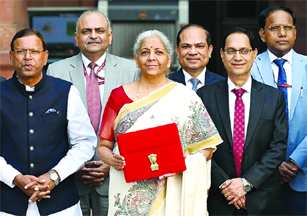
The Union Budget 2025-26, presented by Finance Minister Nirmala Sitharaman on February 1, 2025, outlines the government’s economic priorities and fiscal policies for the upcoming financial year. With a focus on sustainable growth, employment generation, and fiscal prudence, this budget sets the stage for India‘s continued economic expansion. Here’s a detailed analysis of its key aspects:
Macroeconomic Outlook
– GDP Growth Projection: The government estimates GDP growth at 6.8% for FY 2025-26, driven by manufacturing, services, and agriculture sectors.
– Inflation Control: Measures have been introduced to keep inflation in check, aiming for a 4% target through better supply chain management and subsidy rationalization.
– Fiscal Deficit Target: The fiscal deficit is pegged at 4.4% of GDP, down from the previous year’s 4.8%, showing commitment towards fiscal consolidation.
– Disinvestment Target: The government aims to raise ?1.2 lakh crore through strategic disinvestments in PSUs, including a stake sale in Bharat Petroleum Corporation Ltd. (BPCL) and Container Corporation of India (CONCOR).
Taxation Policy Reforms
Direct Taxes
– Personal Income Tax Slabs:
– Income up to Rs5,00,000 – Exempt
– Rs 5,00,001 to Rs10,00,000 – 5%
– Rs10,00,001 to Rs 20,00,000 – 10%
– Rs 20,00,001 to Rs 35,00,000 – 20%
– Above Rs 35,00,000 – 30%
Corporate Tax:
– Retained at 25% for domestic companies.
– Startups to enjoy a tax holiday for five years if annual turnover remains below Rs 100 crore.
Capital Gains Tax:
– Long-term capital gains on listed securities to be taxed at a flat 12% instead of the previous 10% with indexation benefits.
Standard Deduction Increase:
– Salaried individuals and pensioners will now receive a standard deduction of Rs 75,000, up from Rs 50,000.
Indirect Taxes
GST Reforms:
– Rationalization of GST rates on essential commodities.
– Compliance relaxation for small businesses with turnover up to Rs 5 crore.
Customs Duty Adjustments:
– Reduction in import duties on lithium-ion batteries and semiconductor chips to boost domestic production.
– Increase in duties on luxury goods such as imported cars and high-end electronics.
Infrastructure and Capital Expenditure
– Allocation of Rs 12.5 lakh crore for infrastructure projects.
Urban Transport:
– Rs 2.1 lakh crore allocated for metro rail expansion in Mumbai, Bengaluru, Chennai, and Hyderabad.
Highways and Railways:
– National Highway expansion of 10,000 km.
– Introduction of 100 new semi-high-speed Vande Bharat trains.
Smart Cities and Urban Development:
– Rs 50,000 crore allocated for smart cities and urban housing projects.
Agriculture and Rural devp
– PM Dhan-Dhaanya Krishi Yojana launched to increase productivity and reduce post-harvest losses.
– Interest-free loans of up to ?3 lakh for farmers using Kisan Credit Card.
– Incentives for organic and sustainable farming with a Rs 10,000 crore allocation.
– New Pulses Production Initiative to reduce dependence on imports.
Energy and Green Economy
– Renewable Energy Investment:
– Rs 2 lakh crore for solar energy parks and wind power projects.
– Rs1 lakh crore for green hydrogen mission.
EV Promotion:
– Subsidies for electric two-wheelers and four-wheelers extended till 2030.
– Charging infrastructure expansion with a Rs 5,000 crore fund.
Nuclear Power Initiative:
– Government to establish a 100 GW nuclear power capacity by 2047.
MSMEs and Startup Ecosystem
– Credit Guarantee Fund of Rs 50,000 crore for MSMEs.
– Easier loan accessibility for startups through a dedicated Startup Credit Scheme.
– 50% reduction in patent filing fees for startups and MSMEs.
Healthcare and Education
– Ayushman Bharat Expansion:
– Coverage increased to include middle-income families.
– Free annual health check-ups for citizens above 40.
Medical Research Boost:
– Rs 25,000 crore allocated for AI-driven healthcare solutions.
– National Digital Health Mission expansion.
Education:
– 200 new Navodaya schools.
– Rs 1 lakh crore for research grants in higher education.
– National Apprenticeship Scheme for skill development.
Defence and Internal Security
– Defence Budget increased to ?6 lakh crore.
– Indigenous defence production push with 75% allocation to domestic manufacturers.
Cybersecurity Framework:
– Rs 10,000 crore allocated to strengthen cybersecurity measures and combat digital fraud.
Social Welfare and Women Empowerment
– PM Mahila Samriddhi Yojana:
– Low-interest loans for women entrepreneurs.
– Increased maternity leave benefits to 9 months with 100% salary compensation.
– Rs1 lakh crore allocated for rural employment generation.
Digital Economy and AI Integration
– AI-driven governance to reduce bureaucratic inefficiencies.
– Digital Rupee Expansion to enhance financial inclusion.





Be the first to comment